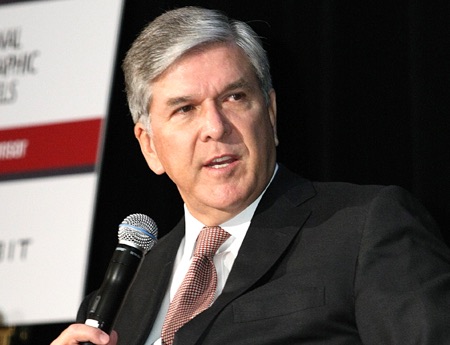NAB's Smith: MVPDs Are Trying to Pad Their Wallets

The smarter way to stay on top of broadcasting and cable industry. Sign up below
You are now subscribed
Your newsletter sign-up was successful
National Association of Broadcasters president Gordon Smith plans to lay into MVPDs in a speech Thursday at the Multicultural Media, Telecom & Internet Council's annual Broadband and Social Justice Summit in Washington. He will also argue that the FCC's hard date for TV stations moving to new channels in the post-incentive auction repack could threaten diversity.
According to excerpts from the speech obtained by B&C, Smith says the FCC "must resist the pay TV industry’s attempt to further pad its wallets through unnecessary government intervention in retransmission consent negotiations."
The FCC is currently in the midst of a congressionally mandated review of what constitutes good faith negotiations. "The pay TV industry’s goal is obvious – as former monopolists, these companies would rather not pay for something they once got for free," Smith says.
As to MVPDs' arguments that broadcaster retrans fees are consumer-unfriendly, Smith says those MVPD's "have no plans to pass along any savings to consumers, reduce equipment fees or make bills comprehensible."
NAB wants the FCC to resist calls to intervene in the retrans marketplace, including via the current proceeding.
"The best way for the FCC to reduce the already low number of actual service disruptions resulting from retransmission consent impasses is to close its proceeding promptly to make clear that cable and satellite bargaining should be with broadcasters, not the federal government," he said.
Smith also weighs in on the spectrum auction.
The smarter way to stay on top of broadcasting and cable industry. Sign up below
He says he would "love" to see the repack completed within 39 months—the FCC's deadline—or even sooner, but said there is no reason to believe that number is correct given that the FCC does not yet know how many stations will have to move. Stations that have not made the move to new channels by that 39 months will have to go dark on their own channel even if they have not been able to go live on the new one.
He said that deadline "throws up unnecessary impediments to any potential move to a next generation broadcast transmission standard" and will "deprive the most vulnerable Americans of free service by forcing many low power and translator stations off the air." And since many of those stations serve up diverse programming to a diverse audience, "it will upend the FCC’s traditional diversity goals by closing off opportunities for new entrants, and disproportionately displacing minority and women-owned stations.
Among the factors that could play into meeting that deadline is availability of tower crews, which could be in short supply as potentially hundreds of stations have to make the move.
He likened setting that hard deadline early in the process to "asking your mechanic to tell you how long it will take to fix your car before he knows what he’s repairing."
Smith said the FCC should wait until the after the auction to establish the timeline, and then commit to an expeditious one.
Contributing editor John Eggerton has been an editor and/or writer on media regulation, legislation and policy for over four decades, including covering the FCC, FTC, Congress, the major media trade associations, and the federal courts. In addition to Multichannel News and Broadcasting + Cable, his work has appeared in Radio World, TV Technology, TV Fax, This Week in Consumer Electronics, Variety and the Encyclopedia Britannica.

